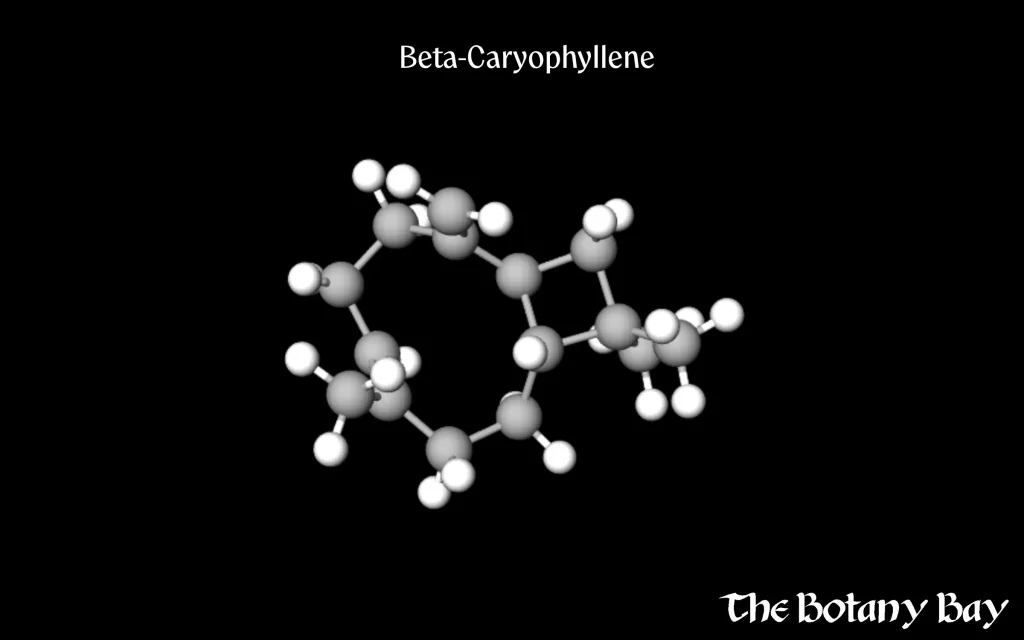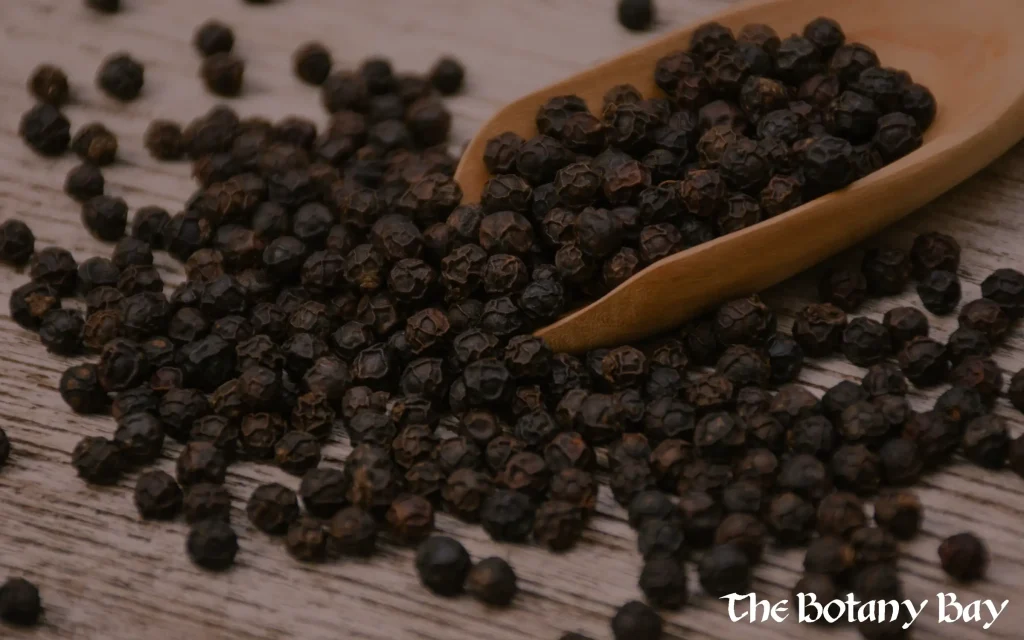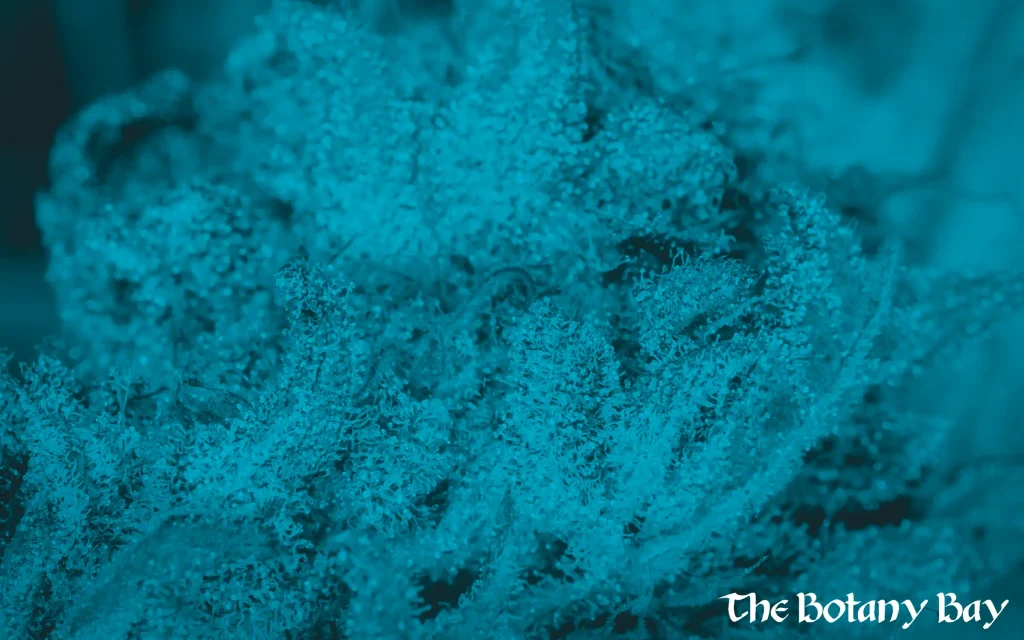Understanding Beta-Caryophyllene
Your Comprehensive Guide to Beta-Caryophyllene
At The Botany Bay, we want you to understand the unique compounds that give hemp, cannabis, and botanicals their signature scents and possible entourage effects. Beta-caryophyllene is a terpene known for its spicy, peppery aroma and its unique ability to interact directly with the body’s endocannabinoid system. It is found in many cannabis strains and in everyday spices like black pepper and cloves.

What Is Beta-Caryophyllene?
Beta-caryophyllene is a sesquiterpene, a type of terpene with a larger molecular structure than monoterpenes like limonene or myrcene. This size and shape allow beta-caryophyllene to do something rare for terpenes: bind directly to CB2 receptors in the endocannabinoid system.
It is present in black pepper, cloves, oregano, cinnamon, hops, and many cannabis varieties. Its distinct spicy, woody, and warm aroma is a key part of the scent profile in certain strains and culinary herbs.
It’s one of the most common terpenes in nature and is biosynthesized by plants as a defense mechanism — deterring pests and protecting against pathogens.
How Beta-Caryophyllene Works in the Body
Beta-caryophyllene interacts with the CB2 receptors, which are primarily located in the body’s immune and peripheral systems rather than the brain. This means it does not produce intoxication, but may still influence how the body responds to cannabinoids.
User reports and early research suggest it may:
Contribute to a grounded, balanced feeling in cannabis blends
Influence the overall experience via the entourage effect
Add depth and spice to the aromatic profile of cannabis and essential oils
These are anecdotal observations and should not be interpreted as medical claims.

Natural Sources of Beta-Caryophyllene
Beyond cannabis, beta-caryophyllene is found in:
Black pepper — its most famous source
Cloves — warm, sweet spice
Oregano and basil — herbal and slightly sweet
Rosemary — woody and aromatic
Cinnamon — spicy and warming
Hops — lending bitterness and aroma to beer
Terpene & Its Oxide
Closely related, slightly different. Flip to learn more.
Beta-caryophyllene is the original terpene with peppery, woody notes and CB2 interaction. Caryophyllene oxide is its oxidized form — sharper in aroma and used in cannabis detection dog training.
More Common Than You Think
Daily sources- flip the box for more info.
Found in black pepper, cloves, oregano, basil, cinnamon, and hops, as well as many cannabis strains. It’s in your spice rack and your favorite beer.
Legal Status of Beta-Caryophyllene
Beta-caryophyllene is fully legal in the United States and internationally. It is widely used in food, fragrance, and cannabis industries. It is non-intoxicating and considered Generally Recognized as Safe (GRAS) when used in normal dietary amounts.

Reported Effects and Benefits of Beta-Caryophyllene
User reports and preliminary research note that beta-caryophyllene may:
Contribute to peppery and spicy aromas in cannabis and food
Support a sense of balance or calm in certain cannabis blends
Work alongside cannabinoids in the entourage effect
Effects are based on user experience and limited research, not guaranteed outcomes.
How to Experience Beta-Caryophyllene
You can encounter beta-caryophyllene in:
✅ Cannabis and Hemp Strains
Common in strains with peppery, earthy, or spicy notes.
✅ Essential Oils
Especially from clove, black pepper, and oregano.
✅ Culinary Herbs and Spices
Sprinkled on food or brewed into teas.
Only use lab-tested, food-grade terpenes for inhalation or ingestion.
Testing and Transparency
At The Botany Bay, we ensure terpene products we carry:
Are third-party tested for purity and content
Use naturally sourced terpenes when possible
Clearly label terpene content and intended uses
Avoid synthetic carriers or unsafe additives
Compliance Disclaimer
This content is for educational purposes only and has not been evaluated by the Food and Drug Administration. Beta-caryophyllene and terpene products are not intended to diagnose, treat, cure, or prevent any disease. Always consult a healthcare provider before using any botanical or terpene product, especially if pregnant, nursing, or taking medications.
FAQs About Beta-Caryophyllene
Is beta-caryophyllene intoxicating?
Does beta-caryophyllene smell like black pepper?
What cannabis strains are high in beta-caryophyllene?
Can I get beta-caryophyllene without cannabis?
NEWSLETTER
Sign up to our newsletter to keep updated with our latest offers and products.
© 2025 The Botany Bay All Rights Reserved
Disclaimer:
Some products sold by The Botany Bay are not scheduled under U.S. federal law but may be subject to state or local restrictions. The Botany Bay conducts due diligence and restricts orders to jurisdictions where these products are legal. Orders placed to prohibited areas will not be fulfilled. However, it remains the customer’s responsibility to ensure compliance with any applicable local, state, or international laws before purchasing. These products have not been evaluated by the FDA and are not intended to diagnose, treat, cure, or prevent any disease.
Kratom Disclaimer:
This product is not available for shipment to the following states: Alabama, Arkansas, Indiana, Louisiana, Rhode Island (until April 1, 2026), Vermont, and Wisconsin; or the following localities: Sarasota County (Florida); San Diego, Oceanside, Newport Beach, and unincorporated San Diego County (California); Alton, Jerseyville, Edwardsville, Glen Carbon, and Godfrey (Illinois); Denver, Monument, and Parker (Colorado); and Union, Alcorn, Lowndes, Monroe, and Tishomingo Counties, as well as the cities of Columbus, Oxford, Ridgeland, Corinth, Belmont, and Gluckstadt (Mississippi).
Cannabinoid Disclaimer:
This product is not available for shipment to states that restrict or ban hemp-derived cannabinoids, including Alaska, Arizona, Arkansas, Colorado, Delaware, Hawaii, Idaho, Iowa, Mississippi, Montana, Nevada, New York, North Dakota, Rhode Island, Utah, and Vermont; or to jurisdictions with specific local prohibitions on psychoactive hemp derivatives (e.g., Delta-8, THCA).
Disambiguation Disclaimer: The Botany Bay is not affiliated with Botany Farms.
- 0 Items
- View Cart
